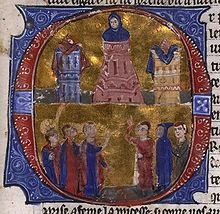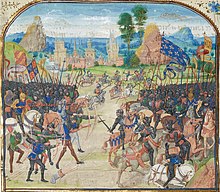Portal:History
The History Portal
History (derived from Ancient Greek ἱστορία (historía) 'inquiry; knowledge acquired by investigation') is the systematic study and documentation of the human past. History is an academic discipline which uses a narrative to describe, examine, question, and analyze past events, and investigate their patterns of cause and effect. Historians debate which narrative best explains an event, as well as the significance of different causes and effects. Historians debate the nature of history as an end in itself, and its usefulness in giving perspective on the problems of the present.
The period of events before the invention of writing systems is considered prehistory. "History" is an umbrella term comprising past events as well as the memory, discovery, collection, organization, presentation, and interpretation of these events. Historians seek knowledge of the past using historical sources such as written documents, oral accounts or traditional oral histories, art and material artifacts, and ecological markers.
Stories common to a particular culture, but not supported by external sources (such as the tales surrounding King Arthur), are usually classified as cultural heritage or legends. History differs from myth in that it is supported by verifiable evidence. However, ancient cultural influences have helped create variant interpretations of the nature of history, which have evolved over the centuries and continue to change today. The modern study of history is wide-ranging, and includes the study of specific regions and certain topical or thematic elements of historical investigation. History is taught as a part of primary and secondary education, and the academic study of history is a major discipline in universities.
Herodotus, a 5th-century BCE Greek historian, is often considered the "father of history", as one of the first historians in the Western tradition, though he has been criticized as the "father of lies". Along with his contemporary Thucydides, he helped form the foundations for the modern study of past events and societies. Their works continue to be read today, and the gap between the culture-focused Herodotus and the military-focused Thucydides remains a point of contention or approach in modern historical writing. In East Asia a state chronicle, the Spring and Autumn Annals, was reputed to date from as early as 722 BCE, though only 2nd-century BCE texts have survived. The title "father of history" has also been attributed, in their respective societies, to Sima Qian, Ibn Khaldun, and Kenneth Dike. (Full article...)
Featured picture
Did you know (auto generated)

- ... that an Armenian Apostolic Church lawsuit over the Zeytun Gospels led Heghnar Zeitlian Watenpaugh to write a history of its separated canon tables?
- ... that Michael Sugrue became an "internet phenomenon" during the COVID-19 pandemic for his lectures on YouTube, recorded in 1992, that covered "the last 3,000 years of Western intellectual history"?
- ... that Frederica Planta designed cards to teach the children of George III and Queen Charlotte the history of England?
- ... that French historian Patrice Gueniffey called the 2023 film Napoleon a "very anti-French and very pro-British" rewrite of history?
- ... that in the first Romanian universal chronicle, Mihail Moxa shows "the God of the Old and New Testaments baptizing His stars with the names of Olympian deities"?
- ... that throughout the history of education in Wales, schools have been held in monastic settlements, cathedrals, residential houses, marketplaces, barns, churches, and village halls?
Paul Palaiologos Tagaris (Greek: Παῦλος Παλαιολόγος Τάγαρις, c. 1320/1340 – after 1394) was a Byzantine Greek monk and impostor. A scion of the Tagaris family, Paul also claimed a somewhat dubious connection with the Palaiologos dynasty that ruled the Byzantine Empire at the time. He fled his marriage as a teenager and became a monk, but soon his fraudulent practices embroiled him in scandal. Fleeing Constantinople, he traveled widely, from Palestine to Persia and Georgia and eventually, via Ukraine and Hungary to Italy, Latin Greece, Cyprus and France.
During his long and tumultuous career, Paul was appointed an Orthodox bishop, sold ordinations to ecclesiastical offices, pretended to be the Orthodox Patriarch of Jerusalem, switched from Greek Orthodoxy to Roman Catholicism and back again, supported both the See of Rome and the Avignon anti-popes in the Western Schism, and managed to be named Latin Patriarch of Constantinople. In the end, his deceptions unmasked, he returned to Constantinople, where he repented and confessed his sins before a synod in 1394. (Full article...)
On this day
- 1809 – Napoleonic Wars: In the Bay of Bengal, a French frigate squadron captured three East Indiamen mainly carrying recruits for the Indian Army.
- 1956 – At the Polish embassy in Moscow, Soviet leader Nikita Khrushchev said "We will bury you" while addressing Western envoys, prompting them to leave the room.
- 1999 – Texas A&M University's Aggie Bonfire collapsed (aftermath pictured), killing 12 people and injuring 27 others, and causing the university to officially declare a hiatus on the 90-year-old annual event.
- 2014 – Two Palestinian men attacked the praying congregants of a synagogue in Jerusalem with axes, knives, and a gun, resulting in eight deaths, including the attackers themselves.
- Rose Philippine Duchesne (d. 1852)
- Lise Østergaard (b. 1924)
- Margaret Atwood (b. 1939)
- Chloë Sevigny (b. 1974)
Selected quote
My heart is a stone: heavy with sadness for my people; cold with the knowledge that no treaty will keep whites out of our lands; hard with the determination to resist as long as I live and breathe.
— Tecumseh, Native American tribal chief
Related portals
More Did you know...
- ... that on 26 April 1881 HMS Doterel (pictured) exploded, killing 143 of the 155 crew members?
- ... that causes of the deaths at the Berlin Wall included shooting, drowning, suffocation, suicide, and falling from a balloon?
- ... that the 19th-century swindler Bertha Heyman, known as "The Confidence Queen," conned men by pretending to be a wealthy woman who was unable to access her fortune?
- ... that only four great uncial codices have survived until the present day?
- ... that after World War II, Polish resistance organizer and Warsaw Uprising fighter Jan Mazurkiewicz was brutally tortured by the authorities in communist Poland?
- ... that tiny Paederus beetles may have caused some of the ten Plagues of Egypt?
- ... that the only known report of bloodshed during the simulated Nazi invasion of Winnipeg was from a woman who cut her thumb while preparing toast?
- ... that Dacian bracelets were used as currency and votive offerings?
Topics
Categories

History • By period • By region • By topic • By ethnic group • Historiography • Archaeology • Books • Maps • Images • Magazines • Organizations • Fictional • Museums • Pseudohistory • Stubs • Timelines • Chronology • People • Wikipedia historians
WikiProjects
![]() WikiProject History •
Ancient Near East • Australian History • Classical Greece and Rome • Dacia • Former countries • History of Canada • Chinese history • European history • Heraldry and vexillology • Indian history • Jewish history • Medieval Scotland • Mesoamerica • Military history • Middle Ages • History of Science
WikiProject History •
Ancient Near East • Australian History • Classical Greece and Rome • Dacia • Former countries • History of Canada • Chinese history • European history • Heraldry and vexillology • Indian history • Jewish history • Medieval Scotland • Mesoamerica • Military history • Middle Ages • History of Science
WikiProject Time • Days of the Year • Years
WikiProject Biography • Composers • Political figures • Saints • United States Presidents
Things you can do
 |
Here are some tasks awaiting attention:
|
Associated Wikimedia
The following Wikimedia Foundation sister projects provide more on this subject:
-
Commons
Free media repository -
Wikibooks
Free textbooks and manuals -
Wikidata
Free knowledge base -
Wikinews
Free-content news -
Wikiquote
Collection of quotations -
Wikisource
Free-content library -
Wikiversity
Free learning tools -
Wiktionary
Dictionary and thesaurus
























































